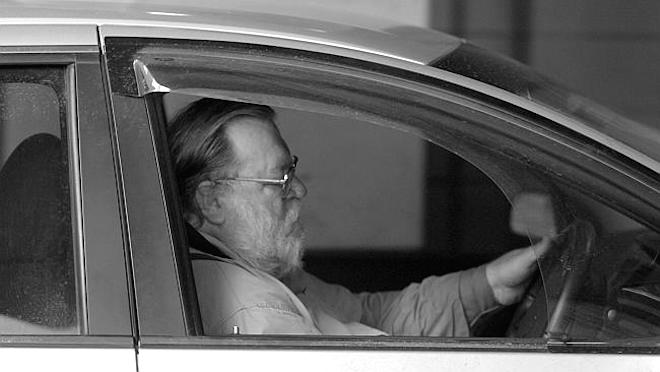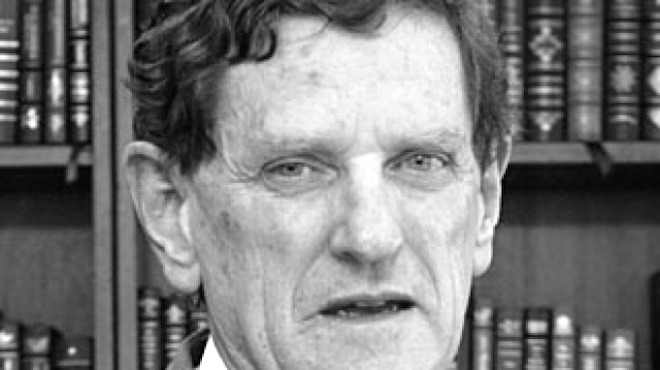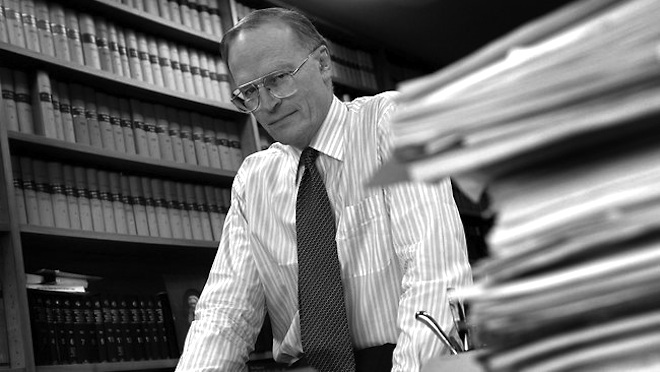It's an ambulatory kinda world
 Deja Vu •
Deja Vu •  Monday, September 15, 2008
Monday, September 15, 2008 The Commonwealth DPP doesn't think that judges have to concentrate all the time ... A judge can be sound asleep, but if that makes no difference to the outcome of a trial, then snooze on ... DPP says it's a matter of effect, not appearances ... High Court transcript makes for fun reading ... From Justinian's archive, September 15, 2008
 Judge Ian Dodd: asleep at the wheel of justice
Judge Ian Dodd: asleep at the wheel of justice
APART from his love of the word “ambulatory”, which he used four times in a morning, Le Chief Justice French seemed to be the one to put his finger on the key issue in the Sleeping Judge Dodd case.
“Beyond the interests of the parties there may be a public interest dimension in cases of process irregularity or process failure in maintaining confidence in the authority of the courts …”
Trials are aborted because jurors played Sudoku or because someone unknown rang a talk back radio show and claimed some jurors in the Gordon Wood trial were planning their own view of the scene.
It stands to reason there was a “public interest” angle in getting a drug conviction retried in the Cesan and Rivadavia cases if the trial judge intermittently snoozed during the proceedings, even while one of the accused was giving evidence.
Everyone else in court was kept awake by the sheer thrill of watching the judge slip in and out of the land of nod.
But the majority the Court of Criminal Appeal (Grove and Howie with Basten in the minority) weren’t much fussed by the public interest.
Wendy Abraham, for the Commonwealth DPP, wasn’t either. She told the High Court on September 3, 2008 that she didn’t accept “the perception aspect”.
So what did the crown come up with to try and bat away the appellants’ case that their trials had miscarried because the Dizzo judge’s sleep apnoea got the better of him?
Basically Abraham (unsuccessfully) submitted that the judge’s inattention had no effect on the outcome of the trial; that counsel for the accused made no complaint at the time; and the jury got a fair and accurate direction.
Never mind the look of it.
When they swept back in after their lunch of larks tongue in aspic Le CJ, along with Vladimir, Kenny Boy, Dyce and the Susies, had already decided that the look of it did matter.
Strangely, Kirbs was absent.
They set aside the nonsense of the Court of Crim Appeal majority and the sentences and ordered new trials for Cesan and Rivadavia.
Here’s some of the most succulent bits of the morning (Sept. 3) transcript:
 Wendy Abraham: Sleep that knits up the ravelled sleave of care
Wendy Abraham: Sleep that knits up the ravelled sleave of care
Counsel didn’t complain, so everything must have been all right
Abraham: In my submission, the fact that no point was taken during the course of the trial - and indeed a reading of the transcript reflects there is no occasion where the judge has been put up saying, ‘Well, you’ve missed this’, or ‘Can you tell this to the jury’ or indeed, ‘You’ve missed this in the summing-up’. There is nothing like that borne out in the transcript at all.
Hayne: But it is not whether the judge missed something; it is whether the jury missed something. The hypothesis for the argument is the judge missed something, but did the jury?
Abraham: With respect, when one goes to look at what the findings of the majority are in terms of the length of time that the trial judge was said to be asleep, in my submission that is critical to that concept, and one must bear in mind the jury were directed accurately and fairly on the factual matters.
Hayne: Yes, if they had heard the evidence - if they had paid attention to the evidence; if they were in a position to judge the evidence.
Abraham: With respect, in my submission, there is no evidence to suggest that the jury were not paying attention, did not know what the accused’s defence was - quite to the contrary.
Kiefel: But the inactivity of counsel, faced with what was occurring, only permits an inference that counsel were not themselves concerned with what was occurring. But that is not conclusive of the question for the court on the facts, is it?
Abraham: It is not conclusive, but in my submission it is highly significant that counsel, with the interests of their client at the forefront, chose, clearly, not to take any point about it.
 French CJ: when does the duty of counsel kick-in?
French CJ: when does the duty of counsel kick-in?
What is the threshold for complaint?
French: How high is the threshold set before counsel has that kind of duty which affects characterisation as a miscarriage of justice?
Abraham: In my submission, when counsel has a genuine concern that it is affecting – whatever it is, whether the inattention is because a judge has nodded off, whether it is because a judge is appearing to be doing something else, in my submission, it is when counsel forms the conclusion that it puts the trial at risk, in effect. In my submission, that is on a case by case basis and counsel have to ...
Hayne: Is that test any different from the ordinary discharge of jury test, high degree of necessity? Are you putting it at some level other than high degree of necessity?
Abraham: I do not know, with respect, that I am putting it at any different level than that ...
Don’t worry about the look of it, the snoozing had no adverse effect
Abraham: In my submission, it would be untenable to suggest that every judge concentrates 100 percent of the time through every proceeding. It does not follow though that there may be periods of inattention, that anything flows as a consequence. In this case, for example, not one person pointed out that the facts were wrong, that he had left out anything about the facts at all [in his summing-up], that they did not accurately reflect the defence case and, indeed, the crown case. Not one thing was said about that. He was obviously paying attention to enable that to have occurred to the satisfaction of those involved ...
Parts of the trial do not matter
Abraham: ... every case will depend on its facts. How one determines it, in my submission, will not be on a particular time. Even Justice Basten accepted that insignificant [sic] would not have affected proceedings, but what does one say in relation to that? Is that one minute in a trial, two minutes, what about a one day trial, a five day trial, a six month trial? Is it a portion of the trial, five percent, one percent? It cannot be any of those. If it is none of those, then it has to be effect, with respect.
Kiefel: So you rely essentially upon the findings of fact made by the majority?
Abraham: Yes.
Kiefel: And if the evidence rather more supported the findings or conclusions reached by Justice Basten, would your submissions necessarily have to change?
Abraham: No, in my submission, on neither scenario. There is one aspect of the evidence I omitted to take your Honours to ...
Hayne: Just before you do that, is not the premise of the argument you have just advanced in answer to Justice Kiefel that there are parts of the proceedings at trial which do not really much matter?
Abraham: No.
Hayne: Well, if once you are down into questions of effect, I do not see what other premise you can have.
 Heydon: no reading books or writing letters while sitting on a trial
Heydon: no reading books or writing letters while sitting on a trial
Sleep doesn’t mean inattention
Abraham: For a start, can I indicate the transcript indicates that on a number of occasions there was a lot of intervention by the trial judge, but leaving that to one side for the moment, in my submission, one cannot reason from the proposition that there was no interaction, therefore the trial judge was asleep.
The obvious reason why there might be no interaction is there was no basis to interact and, with respect, particularly so here, because there has been no complaint that anything was not attended to…
[snip]
The consequence, in my submission, of the point that is now being raised is much broader because, in my submission, it is attentiveness or inattention which is the issue as opposed to the cause, which means, with respect, that one is looking at, in my submission, the effect ultimately at the end of the day. If it is purely a question of attentiveness or not, one would have, with respect, a myriad of inquiries down the track with, with all due respect, speculation as to whether the judge was or was not listening, was or was not interested, was he reading a book, was he writing a judgment, was he looking out the window?
Heydon: I think those are quite relevant inquiries. Judges are not supposed to read books or work on other judgments or conduct correspondence when they are supposed to be attending to a trial.
Abraham: Your Honour, I am not suggesting a judge should not be being attentive to the proceedings, but, with respect, it would be naive to suggest that in every case a judge concentrates for 100 percent of the time ...
[No, they just have to look as though they are, surely.]
No miscarriage if counsel is incompetent – same if judge is sleepy
Abraham: In my submission, it is no different in some senses if one has counsel that is clearly proved to be incompetent. That was not considered to be enough by itself to found a miscarriage, or a prosecutor that clearly acted inappropriately. So, in my submission, the reasoning that is now being put in relation to miscarriage seems to be, with respect, that there is some prejudice really relying from the written submissions from the perception cases…
In my submission, it is not appropriate to take from cases dealing with bias the rationale behind that and import it into whether or not there is a miscarriage here ...
Please, no more.
After le déjeuner Le CJ said in relation to both appeals:
1. The appeals be allowed.
2. The orders of the Court of Criminal Appeal of the Supreme Court of New South Wales made on 5 September 2007 dismissing the appellants’ appeals against conviction and sentence be set aside and, in their place, there be orders:
(a) The appeal to the Court of Criminal Appeal against conviction be allowed and the appellants’ conviction be quashed.
(b) There be a new trial of the appellant.









Reader Comments